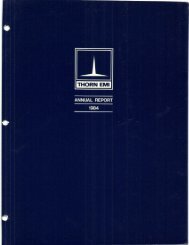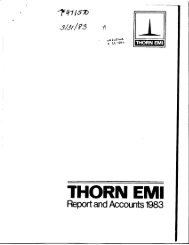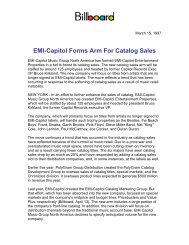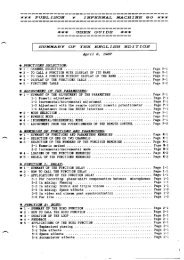Thorn-EMI 1995 Annual Report
Thorn-EMI 1995 Annual Report
Thorn-EMI 1995 Annual Report
Create successful ePaper yourself
Turn your PDF publications into a flip-book with our unique Google optimized e-Paper software.
Notes to the accounts<br />
32. Directors'and employees, emoluments and Directors, interests contjnued<br />
diff-erence between the market share price when the option is exercised and the price to be paid<br />
lor the shares. The greater the share price growth between grant and exercise, the more valuable<br />
the option. Tax is due on the gain either on exercise or on the sale of the resulting shares.<br />
The right to exercise normally only arises in the period between three and ten years from<br />
the grant, after which the option cannot be exercised. options granted in <strong>1995</strong> and thereafter<br />
(under the new Executive Share Option Scheme to be put to shareholders for approval at the<br />
<strong>1995</strong> <strong>Annual</strong> General Meeting) can only be exercised ifperformance targets, as set by the<br />
committee, are met. It is intended that the initial performance target will be Total Shareholder<br />
Return ("TSR"), i.e. based on share price growth plus dividends, over the measurement period<br />
determined by the Committee. For an option to be exercisable, THORN <strong>EMI</strong>,s TSR must be at<br />
least at the median of the companies comprising the FT-SE 100 at the start of the period.<br />
A share option is generally granted in relation to its "face value" i.e. the number of shares<br />
under option multiplied by the price to be paid on exercise. Each year the uK Executive Directors<br />
are typically granted share options with a lace value of1000/o ofbase salary, to a maximum over<br />
any ten-year period ofeight times annual earnings. Options with a face value ofup to four times<br />
annual earnings are granted under shareholder-approved Executive Share Option Schemes. The<br />
remainder may be in the form of SARs whereby, instead of buying the shares on exercise,<br />
the executive is paid the "gain" between the market share price at the grant and the exercise.<br />
To reinforce its long-term nature, an SAR cannot normally be exercised in part earlier than<br />
four years and in lull earlier than six years from grant. For SARS granted on or before July 1994,<br />
to ensure that gains reflect true performance and not simply inflationary share price rises, any<br />
"gain" is reduced to the amount by which the share price growth exceeds the UK Retail Prices<br />
Index ("RPI") over the period between the grant and the exercise. The exercise of SARs granted<br />
afterJuly 1994, as with all Executive Options granted after this date, is subtect to the<br />
achievement of performance targets as set by the Committee.<br />
In addition, the UK Executive Directors and all other eligible employees are entitled to<br />
apply for options under the shareholder-approved Savings-Related Share Option Scheme<br />
("ShareSave Scheme"). The number of options granted is related to the value of savings made by<br />
the employee under a Save-As-You-Earn contract over frve years. The maximum total monthly<br />
savings an employee may make is currently !250. The option price is currently set at 800/o of the<br />
market share price prior to the grant and the right to exercise normally only arises for a sixmonth<br />
period once the five years savings have been completed.<br />
Retirement Benefits<br />
UK Executive Directors are members of the Group's UK contributory Pension Fund which,<br />
subject to Inland Revenue limits, provides them with a pension of up to two-thirds of base<br />
salary after 20 years membership (or 10 years for those who joined before 17 March 1987),<br />
together with benehts on death or disability. Mr Fifield is a member of three co-ordinated<br />
defined contribution retirement plans operated by <strong>EMI</strong> Music in the US (see section (v) of this<br />
Note).<br />
Entitlement to notice<br />
Each Executive Director has an employment contract with entitlement to notice. During<br />
the year, all the UK Executive Directors voluntarily agreed (without compensation) to reduce<br />
their normal notice period to 24 months (increasing to 36 months in the event of a change in<br />
control of the Company). It is the Company's intention to limit the normal notice period of<br />
future Executive Directors to 24 months. Furthermore, it has been and continues to be the<br />
Committee's practice to scrutinise the compensation entitlement of any departing Executive<br />
Director with particular focus on his or her legal duty to mitigate loss, thereby reducing any<br />
termination payment. Mr Fifleld's employment contract has specific terms covering his<br />
obligation to mitigate in the event of the termination ofhis employment. Non-executive<br />
Directors do not have contracts, but each appointment is subject to review every three years.
















